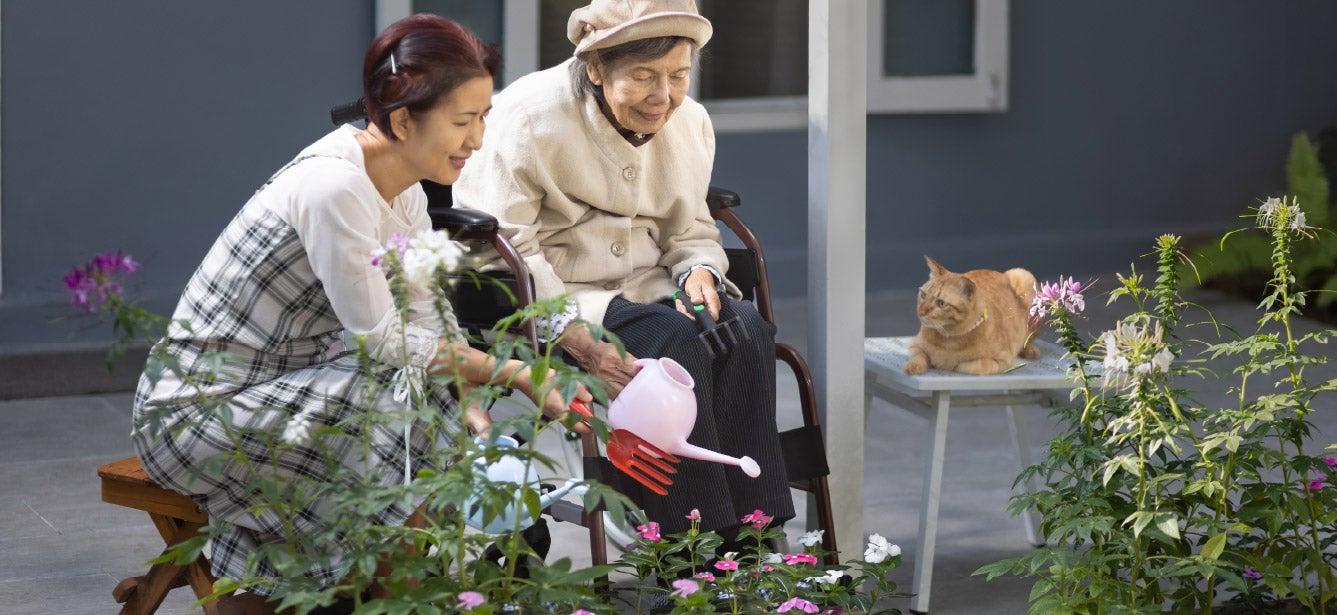Alzheimer's and Dementia Caregivers: 5 Ways to Help Find Nourishment
5 min read

Related Topics
Are you caring for a parent, spouse, other relative, or friend with Alzheimer's or dementia? Do you know someone who is? NCOA has put together this caregivers' toolbox to help.
Self-care for Alzheimer's and dementia caregivers
First, remember that there are two people who need attention in this scenario: the person with dementia, and you. Unpaid caregiving is incredibly hard work—even when performed out of love—and its stresses can build up over time.
“Most people who care for a family member with dementia spend at least a year in that role,” said Kathleen Cameron, former Senior Director of NCOA’s Center for Healthy Aging, “and more than half devote four or more years to it. It’s easy to get caught up in everyday demands without realizing the negative impacts on your own well-being.”
That’s why carving out time for your own physical, mental, and financial health is so important. As the modern-day philosopher Emily Maroutian says, “A tree that refuses water and sunlight for itself can’t bear fruit for others.”
5 tips for finding the nourishment you need when caring for someone with Alzheimer's:
1. Adult day services
Many aging services organizations offer these programs, which are mutually beneficial. They provide safe, professionally supervised opportunities for your loved one to socialize and take part in creative activities, while giving you a much needed break.
“And they can be a critical piece of the caregiving puzzle if you’re employed outside the home,” Cameron said. “Knowing that your family member is in capable hands while you’re at work provides much-needed peace of mind while supporting your own needs, too.” Check with your area agency on aging for help finding a program near you, and for guidance on how to evaluate the options—including costs and how to pay for them. The National Adult Day Services Association has a "Find a Center" page where you can search by company name, city, or ZIP code.
2. Support groups for Alzheimer's and dementia caregivers
It's easy to feel isolated and alone as a family caregiver. Your responsibilities can interfere with opportunities for social connection; and other people may not truly understand what you’re going through, which can add to the burden.
In-person or online dementia support groups connect you with other caregivers who can empathize. Some groups are guided by trained facilitators while others are peer-led; all offer opportunities to share experiences and advice, get practical tips, and even share your negative emotions without fear of judgment. Visit the Alzheimer’s Association for a searchable database of support groups near you. You can also check with your local senior center for suggestions.
3. Financial help for Alzheimer’s and dementia caregivers
In 2023, according to the Alzheimer’s Association, the total lifetime cost of care for a person living with dementia was nearly $400,000. And family caregivers absorb as much as 70% of those costs.1
“From lost wages to increased grocery bills to other unanticipated out-of-pocket caregiving costs, the financial consequences can be devastating,” Cameron said. “As many as 40% of unpaid caregivers worry about having enough money to put food on the table every night.”
You don’t have to bear these burdens silently, or without assistance. The National Council on Aging’s BenefitsCheckUp® offers easy access to benefits programs and resources that empower older adults, people with disabilities, and caregivers to apply for benefits programs that can help pay for health care, medicine, food, utilities, and more. If you are employed, find out about employee benefits that support you as a caregiver, such as paid time off, flexible scheduling, remote work, reduction to part time, job sharing, and specialized caregiver services.2
4. Plan for future needs
As your loved one’s condition progresses, their needs will change—and so will yours. Seek help in creating a plan that will address the needs of your care recipient as their needs change.
Your local area agency on aging or a geriatric care manager can help with making decisions about care changes, such as when and where to move when needs escalate and you are no longer able to continue caregiving responsibilities. Understanding the costs of care and the sources of funding to support memory care or skilled nursing care is esstenial. Having a plan in place will also give you as a caregiver peace of mind.
5. Additional dementia resources for family members and caregivers
Be sure to bookmark NCOA’s Alzheimer’s and Dementia for Caregivers resource page, where you can always find the latest information, advice, and support.
You can also:
- Access a variety of helpful tips for Alzheimer’s and dementia caregivers.
- Get dementia caregiving advice from someone who’s been there.
- Find suggestions for managing your finances as an unpaid adult caregiver.
- Discover ideas for hobbies that can ease caregiver stress.
And remember to be gentle with yourself, Cameron says “You are doing a tremendous thing for your loved one. You don’t have to be perfect, and no family caregiver is. Ask for help when you need it, take time to exercise and get enough sleep, and then you can show up refreshed and recharged.”
Who are Alzheimer's and dementia caregivers?
Today in America, more 6 million older adults age 65 and over have Alzheimer’s disease—a number that’s expected to nearly double by 2050.1 As a result, the need for skilled professionals who can help care for this population will only continue to grow.
“Yet demand already outstrips supply,” Cameron said.
According to the Alzheimer’s Association,1 “we will need another 1.2 million direct care workers within the next seven years in order to bridge that gap,” she continued. “This represents the largest workforce shortage in the U.S. right now—which is saying a lot—and it’s one that will take focused, coordinated, and committed effort to address.”
In the meantime, 11 million dedicated spouses, children, siblings, grandchildren, and other relatives provide more than 18 billion hours of unpaid care worth nearly $140 billion each year.1 The work can be exhausting, both physically and emotionally, and it takes a measurable toll on caregivers’ personal relationships, financial security, and health.
Family dementia caregivers are:
- Mostly women (66%)
- Often daughters (33%)
- Commonly 65+ (30%)
- Sole providers (41%)
- Highly stressed (59%)
- Food insecure (40%)
“This is why we constantly ask, ‘how can we better support the caregivers of dementia patients?’” Cameron said. “People serving in this role often describe their responsibilities as having a full-time job—and in fact, many of them have to give up their paid employment because there’s no room for both."
What dementia caregivers need most are meaningful policies that recognize and compensate them for their absolutely crucial work. Until then, they also need to know they are not alone,” Cameron said.
Sources
1. Alzheimer’s Association. 2024 Alzheimer’s Disease Facts and Figures. Found on the internet at https://www.alz.org/media/Documents/alzheimers-facts-and-figures.pdf
2. Rosalynn Carter Institute for Caregivers and Public Opinion Strategies. Working While Caring: A National Survey of Caregiver Stress in the U.S. Workforce. June 2021. Found on the internet at https://rosalynncarter.org/wp-content/uploads/2021/09/210140-RCI-National-Surveys-Executive-Summary-Update-9.22.21.pdf




